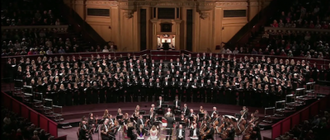Gospel in Art: The only son of his mother, and she a widow

Royal Choral Society at Royal Albert Hall. Handel, 'Since by man came death' from Messiah
Source: Christian Art
Gospel of 13 September 2022
Luke 7:11-17
Jesus went to a town called Nain, accompanied by his disciples and a great number of people. When he was near the gate of the town it happened that a dead man was being carried out for burial, the only son of his mother, and she was a widow. And a considerable number of the townspeople were with her. When the Lord saw her he felt sorry for her. 'Do not cry' he said. Then he went up and put his hand on the bier and the bearers stood still, and he said, 'Young man, I tell you to get up.' And the dead man sat up and began to talk, and Jesus gave him to his mother. Everyone was filled with awe and praised God saying, 'A great prophet has appeared among us; God has visited his people.' And this opinion of him spread throughout Judaea and all over the countryside.
Reflection on the music
"Since by man came death, by man came also the resurrection of the dead." Those words are set to stirring music by George Frideric Handel in his much-loved oratorio Messiah, first performed in Dublin in 1742, but firmly established in the repertoire of choirs and choral societies throughout the English-speaking world ever since. In this oratorio, Handel takes us on a journey through salvation history, beginning with the prophecies of Isaiah, and passing through the birth, death and resurrection of Jesus. Unusually, every single word is taken from Scripture - most oratorios, including Handel's, would have included a good number of poetic reflections on the story as it unfolds.
This chorus comes in part 3, which is devoted to the Resurrection. Handel uses a text from St Paul's First Letter to the Corinthians, which falls into two clear sections, each consisting of a contrast between death and life. Handel, ever a master of contrasts, moves from the sadness of death to unbridled joy at the prospect of resurrection.
The story about Jesus' encounter with the widow of Nain, when he raised her dead son to life, tells us all we need to know about Jesus' conquest of death and his promise of new life. While it is rare for those who have died to be returned to their mortal life, we are all offered a share in Jesus' immortal life as the destiny awaiting us after our earthly death. And that offer of life comes through Jesus. "For as in Adam all die, even so in Christ shall all be made alive." This story, though, is just as much about the widow as it's about her son. She would have been destitute without anyone to support her. Restoring her son to her meant giving her back her livelihood, which would otherwise have been lost. Jesus is the source of life in all its fulness.
Reflection written by Mgr Philip Whitmore, parish priest of St James' Church, Spanish Place, central London. Previously he lived for over 20 years in Rome, working first in the Vatican and then as Rector of the Venerable English College. Before becoming a priest, he was a music historian based at Magdalen College, Oxford.
LINKS
Click here to watch the video: www.youtube.com/watch?v=7tViHs7MeTk
Gospel in Art: https://christian.art/
Todays reflection: https://christian.art/daily-gospel-reading/luke-7-11-17-2022/
Watch a video recording of the talk Deacon Patrick gave on 11 September at St Mary's, Hampstead: www.churchservices.tv/hampstead/archive/recordings/3Eu6yF0Z7bacmV4


















